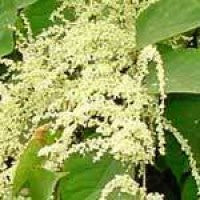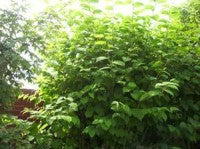Experts warn of potential knotweed epidemic this summer
 'Under qualified treatment specialists are making a serious problem worse'
'Under qualified treatment specialists are making a serious problem worse'
The scourge of Japanese knotweed infestation could reach unprecedented UK levels this summer and the problem is being exacerbated by many of the companies brought in to treat it. That's the warning from industry specialist, Richard Podmore, who believes that untrained and under qualified treatment 'experts' are potentially making a serious problem worse.
Speaking on the eve of the new growing season, typically the start of May, which could see the problem escalate to more than one serious Japanese knotweed infestation for every 10km in England and Wales, Podmore, joint managing director of Cheshire-based Japanese Knotweed Control, is concerned that the lack of regulation means many of the new entrants into the market are just not up to the job.
"Japanese knotweed contamination is now much more widely recognised as a major problem, not least by developers, local authorities and highway agencies, but as a result everyone is suddenly an expert on how it should best be treated.
"The reality is that many of the companies now offering a treatment service do not have the necessary equipment, qualifications, insurance cover or experience to do it properly and they could in fact only make matters worse," said Podmore.
A prolific grower, Japanese knotweed has the ability to reproduce itself frequently and quickly. Within weeks of the growing season starting it can become dense clumps of weeds up to three metres in height, and whilst it does die back each year it never becomes dormant and its ability to reproduce itself is the reason the weed is so invasive. Climactic conditions over the past few months have also paved the way for potentially prolific growth this summer.
Even when practiced by seasoned professionals, traditional treatment methods such as chemical spraying and 'dig and dump' can be costly, time-consuming and not always 100% effective and can also carry some environmental risks. In the hands of inexperienced operators, incorrect dosages of herbicide can cause the plant to mutate and dwarf making it even harder to treat when the professionals are finally called in. Correct disposal of the weed is also crucially important. Unless the plant is appropriately disposed of as hazardous waste, the problem is just transferred to a different location.
Although it is the commercial sector, for example house builders and developers, that is most effected by Japanese knotweed, more and more individual householders and gardeners are also becoming aware of the issue, and again this is of concern to Richard Podmore.
"As they encounter the problem in their own gardens and allotments they may call in a local treatment specialist in the same way they'd call in a plumber, but unfortunately, as with plumbers, the service can be of variable quality. With minimal checks and safeguards apparently being made by the authorities, responsibility falls back on businesses and householders to check credentials of the so-called 'specialists' and if they don't, they could be making the problem worse not better."
www.cdae.co.uk/jkc/index.html
T : 0845 643 1168
